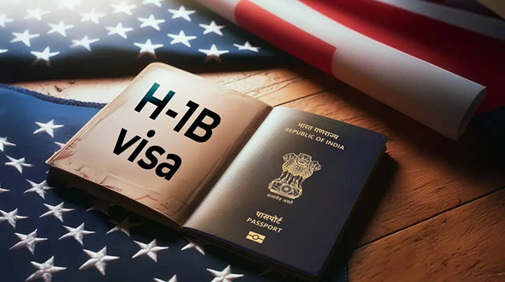(Preliminary Exam: Current Affairs)
(Mains Exam, General Studies Paper-2: Impact of policies and politics of developed and developing countries on India's interests; NRIs) |

Reference
The US Commerce Secretary called the popular H-1B visa program a scam and said that American companies should hire American citizens instead of foreign workers. This statement reflects the policy of the Donald Trump administration in which there is a demand to reduce dependence on foreign workers and give priority to American workers. This policy has the greatest impact on countries like India because Indians are the biggest beneficiaries of H-1B visa.
What is H-1B Visa Program
H-1B visa is a non-immigrant visa, under which American employers can hire foreign employees in positions requiring high skills (especially in STEM fields - science, technology, engineering and mathematics).
- This program was started in the year 1990. Its maximum duration is 6 years.
- The annual cap on visas is 65,000, with an additional 20,000 slots available for holders of masters or higher degrees from US universities.
- Applicants associated with education and non-profit research institutions are exempt from this cap.
Key Features
- Giving opportunities to foreign high-skilled workers in US industries
- Giving employers an option when US workers are not available
- Highest demand in IT and technology companies
- Dominance of Indian professionals
- More than 72% of H-1B approvals in the year 2023 were given to Indians.
Recent Issues and Criticisms
- The Trump administration and Republican leaders allege that companies misuse this visa to hire cheap foreign workers.
- Critics say that American workers are losing jobs and their wages are decreasing.
- Most Indian H-1B holders had salaries of less than $100,000 in 2023, while the average salary of US IT professionals was $104,000.
- This program is being described as 'against American workers'.
Proposed changes
- The Trump administration proposed a rule in 2021 in which visa selection was to be based on salary level - priority to those who earn higher salaries.
- Entry-level (Level 1, Level 2) employees working on low salaries would be at a loss.
- New schemes like 'Golden Card' have also emerged, under which it is proposed to give citizenship to wealthy investors.
Impact on US economy
- Positive side: H-1B visas help the US get the best talent from around the world who contribute to innovation and technological development.
- Negative side: The income and opportunities of American employees may be affected due to cheap labor.
Impact on workers
- Indian professionals get high-level opportunities in the US but salary inequality and difficulty in getting permanent residency (green card) persists.
- The proposed changes will increase challenges for foreign students and youth working at the entry level.
Challenges
- Growing nativism in US politics
- Striking a balance between US workers and foreign professionals
- Green card backlog for Indian professionals; waiting for many years
- Global competition; attracting talent from China and other countries
Way forward
- The US will have to adopt a balanced policy that benefits high-skilled foreign talent while also securing opportunities for American workers.
- It is important for countries like India to create high-skilled jobs in their economy so that talented youth do not become dependent on foreign countries.
- At the bilateral level, India-US should increase constructive dialogue on policies like H-1B and Green Card.

 Contact Us
Contact Us  New Batch : 9555124124/ 7428085757
New Batch : 9555124124/ 7428085757  Tech Support : 9555124124/ 7428085757
Tech Support : 9555124124/ 7428085757








